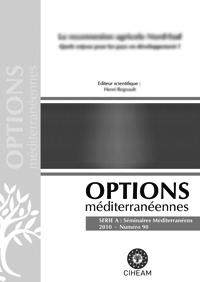| Article précédent | p. 157-161 | Article suivant |
Field screening of some hull-less barley (Hordeum vulgare L.) against soil salinity in Egypt
Twenty nine hull-less and one hulled barley genotypes (Hordeum vulgare L.) were grown in the field at the Soil Salinity Lab., Alexandria, for one growth season (1998-99). These genotypes were tested for their performance under natural field salinity conditions. Soil salinity as electrical conductivity of saturated soil paste extract (ECe) was determined and distinguished into two levels. Biological and grain yields as well as number of spikes were significantly affected by soil salinity levels and genotypes. Genotype 9 LHB93-4 (Rondo), seems to have good salt tolerance with regard to its absolute yield and also its minimum relative yield decrease on increasing soil salinity to the higher level. The check variety Giza 123 has higher salt tolerance than the hull-less genotypes. It produced 2.3-2.4 times that of the highest hull-less genotypes under both soil salinity levels. Future hull-less barley breeding programs for salt tolerance improvements might exploit genotype 9 LHB93-4 (Rondo) and Giza 123.
- [ Afficher ]
- [ Télécharger ]
- [ Exporter la citation ]
Vous pouvez télécharger la citation au format :
- [ Imprimer ]
-
Mots-clés
EGYPTE, HORDEUM VULGARE, MONDAGE, ORGE, SALINITE DU SOLCiter cet article
El Sayed A.A., Khodier M.M. Field screening of some hull-less barley (Hordeum vulgare L.) against soil salinity in Egypt. In : Cantero-Martínez C. (ed.), Gabiña D. (ed.). Mediterranean rainfed agriculture: Strategies for sustainability . Zaragoza : CIHEAM, 2004. p. 157-161. (Options Méditerranéennes : Série A. Séminaires Méditerranéens; n. 60). Final Seminar of the Regional Action Programme on Rainfed Agriculture (RAP-RAG), 2003/06/02-03, Zaragoza (Spain). http://om.ciheam.org/om/pdf/a60/04600057.pdf



